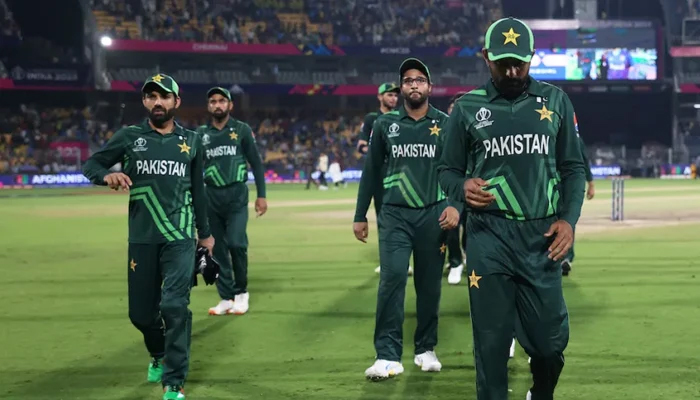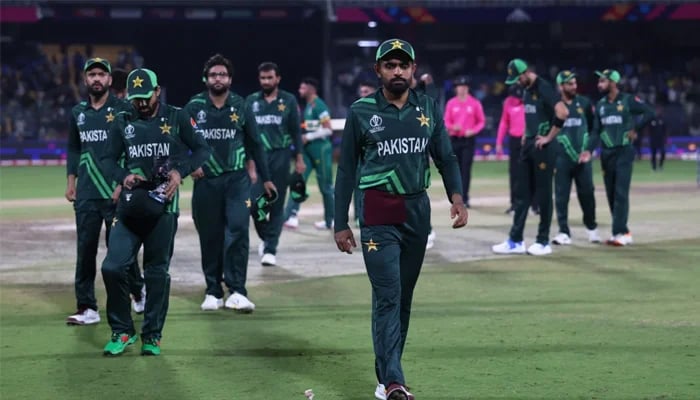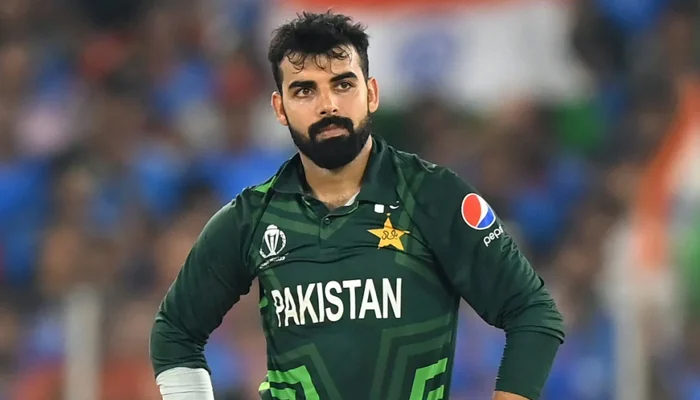Report card: Pakistan fail to make a mark in showpiece World Cup event
Pakistan fell short of reaching semi-finals in World Cup 2023, similar to what happened in World Cup 2019 in England
November 15, 2023

With four wins, five defeats and a disappointing end to the ICC World Cup 2023 campaign, Pakistan once again failed to make a mark in a 50-over mega event.
The Men in Green with high hopes and a great record under the leadership of Babar Azam travelled to India for the competition but again they fell short of reaching the semi-finals, similar to what happened in the 2019 World Cup in England.
But this time, Pakistan didn't peak. They lost to bigger opponents and most shockingly to Afghanistan in Chennai. This was the first time in history, that Pakistan lost five games in a single World Cup edition.
In this statistical review, we look at Pakistan's overall campaign, positives to take home, areas to improve and Player of the Tournament.
Overview
Babar Azam and Co. had a brilliant start to the campaign where they defeated the Netherlands by 69 runs and Sri Lanka by six wickets. They created history against the Islanders, registering the highest-ever chase in the World Cup (345/4).

However, the progress down the hill started with India again beating Pakistan in Ahmedabad and asserting their streak of 8-0.
The Men in Green had a chance to break their record of the highest chase on the smaller venue of Bengaluru's M. Chinnaswamy Stadium but got restricted to 302 in a chase of 368 against the five-time World Cup champions, Australia.
The morale was down and there was a chance to gain momentum back but the unexpected happened. Afghanistan outclassed by eight wickets in Chennai, their first victory in ODIs over Pakistan.
The match against South Africa carried the same story initially but Babar Azam's men fought back only to lose by one wicket.

Pakistan travelled to Kolkata to play Bangladesh and since the latter were also down and out, we clinched victory over them by seven wickets courtesy of Fakhar Zaman's comeback 81.
Pakistan's very own Qudrat ka Nizam came into play after they managed to bag a win over New Zealand in Bengaluru by virtue of the DLS method by 21 runs.
Calculative batting by Fakhar Zaman and Babar Azam led us to victory despite conceding 401 bowling first.
In the end, there was way too much to do and expect other results to go in favour. Like New Zealand losing to Sri Lanka but it didn't happen and eventually the Men in Green also lost to England and Pakistan's hopes of replicating the 1992 winning campaign drowned.
Positives to take home
The emergence of Abdullah Shafique as the opener was eye-catching. After being provided the opportunity, the 24-year-old made the most out of the opportunity, scoring 336 runs at an average of 42.00.
Special mention to Mohammad Rizwan for being the driving force in the middle-order and finishing as the leading run-getter for Pakistan with a tally of 395 runs.
Despite not taking plenty of wickets with the new ball, Shaheen Afridi was the star with the ball for Pakistan and finished with 18 wickets. The Eagle now has 34 wickets to his name in the World Cup
Areas to improve
The concern many stressed was Pakistan's spin bowling and they looked completely out of colour. Despite conditions favourable for them, they only took 12 wickets.
Shadab Khan and Mohammad Nawaz - two of them who were backed by the captain throughout failed - only picked two wickets each respectively.

The second major concern was batting in the powerplay. Not taking advantage of the circle compared to other teams was evident.
In 2023, Pakistan played 20 ODIs before their match against Afghanistan on October 23. They smashed a total of 81 sixes during these matches, and interestingly, none occurred during the first powerplay, covering the first ten overs of the batting innings.

The streak came to an end in the fifth over against Afghanistan. Shafique broke the dry spell by confidently dispatching a short ball from Naveen, sending it soaring towards deep square leg for a maximum. This marked the team's first six in the powerplay after a span of 1,168 balls.
Eventually, the Men in Green hit 9 sixes in the powerplay throughout the World Cup.
Player of the Tournament
In so many disappointments, the emergence of Mohammad Wasim Jr. is something to cheer. The right-arm pacer debuting in the World Cup that too against South Africa was heartening. It was him who brought Pakistan back into the game with a wicket of Heinrich Klassen.

He finished with 10 wickets in four games with an economy of 5.63 - the lowest among all Pakistan bowlers.
Way to go
Pakistan are not scheduled to play an ODI for at least next 12 months. Their next 50-over game is in Australia in November 2024 which is also one of the major loopholes of scheduling since they will be playing Champions Trophy 2025 at home and will go into the tournament by playing close to a dozen of ODIs.
The changes are surely around the corner whether it's captaincy, team combination or coaching panel. Time will tell whether they will learn from their mistakes in this tournament or if the circus remains the same before the 2027 edition of the competition.
Originally published in Geo Super











